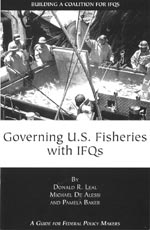A Summary

More than one-fourth of the major U.S. fisheries are either overfished or are being fished unsustainably. Congress is getting ready to reauthorize the Magnuson-Stevens Act, the law governing our nation’s fisheries. Although some provisions are controversial, the authorization of individual fishing quotas (IFQs) is not. IFQs are an important innovation (they are part of a larger category called Limited Access Privileges).
, PERC’s third booklet analyzing IFQs, shows how IFQs change the ways that fisheries are governed: They end overfishing while allowing fishermen to obtain a decent livelihood.
Coastal fisheries are managed through a complex structure that involves several governing bodies and spends considerable resources – some $600 million in direct federal expenditures annually. Two goals of this governance are sustainable fisheries and a healthy marine environment. Unfortunately, the rules of governance have often become so restrictive that that fishing is dangerous and often financially unrewarding. The result is hostility rather than cooperation and in many cases failure to achieve these long-term goals.
This booklet discusses how governing the fishery with individual fishing quotas, or IFQs, can make governance sensible and fishing sustainable. Written by Donald R. Leal, Michael De Alessi, and Pamela Baker, it is based on a 2005 congressional briefing sponsored by the Property and Environment Research Center (PERC), the Reason Public Policy Institute, and Environmental Defense. The briefing featured three experts in fisheries management, David Austin McKinney, Bruce R. Turris, and Michael Arbuckle, each of whom has had pivotal roles in the transition to IFQs. Their observations and insights are reflected in this essay.


